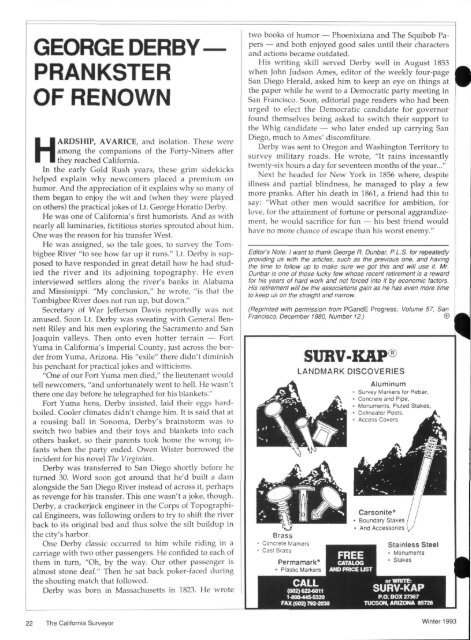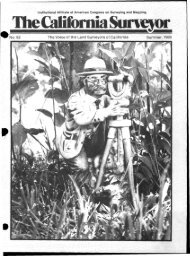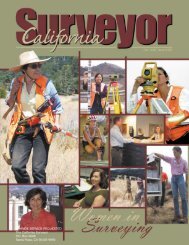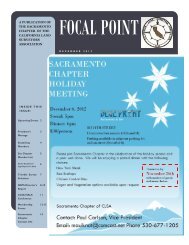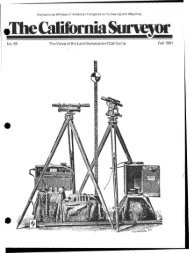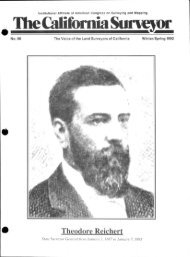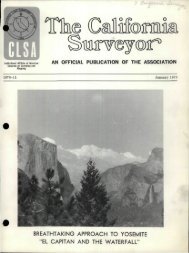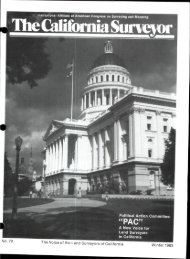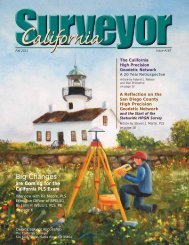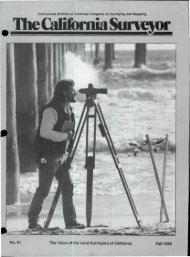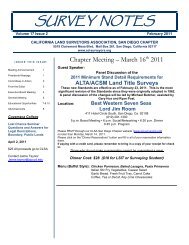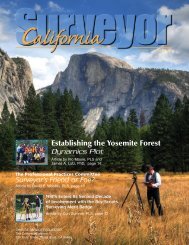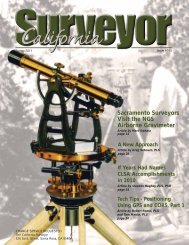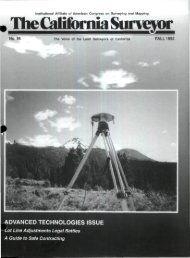t The California Surveyor - CLSA
t The California Surveyor - CLSA
t The California Surveyor - CLSA
You also want an ePaper? Increase the reach of your titles
YUMPU automatically turns print PDFs into web optimized ePapers that Google loves.
GEORGE DERBY—<br />
PRANKSTER<br />
OF RENOWN<br />
HARDSHIP, AVARICE, and isolation. <strong>The</strong>se were<br />
among the companions of the Forty-Niners after<br />
they reached <strong>California</strong>.<br />
In the early Gold Rush years, these grim sidekicks<br />
helped explain why newcomers placed a premium on<br />
humor. And the appreciation of it explains why so many of<br />
them began to enjoy the wit and (when they were played<br />
on others) the practical jokes of Lt. George Horatio Derby.<br />
He was one of <strong>California</strong>'s first humorists. And as with<br />
nearly all luminaries, fictitious stories sprouted about him.<br />
One was the reason for his transfer West.<br />
He was assigned, so the tale goes, to survey the Tombigbee<br />
River "to see how far up it runs." Lt. Derby is supposed<br />
to have responded in great detail how he had studied<br />
the river and its adjoining topography. He even<br />
interviewed settlers along the river's banks in Alabama<br />
and Mississippi. "My conclusion," he wrote, "is that the<br />
Tombigbee River does not run up, but down."<br />
Secretary of War Jefferson Davis reportedly was not<br />
amused. Soon Lt. Derby was sweating with General Bennett<br />
Riley and his men exploring the Sacramento and San<br />
Joaquin valleys. <strong>The</strong>n onto even hotter terrain — Fort<br />
Yuma in <strong>California</strong>'s Imperial County, just across the border<br />
from Yuma, Arizona. His "exile" there didn't diminish<br />
his penchant for practical jokes and witticisms.<br />
"One of our Fort Yuma men died," the lieutenant would<br />
tell newcomers, "and unfortunately went to hell. He wasn't<br />
there one day before he telegraphed for his blankets."<br />
Fort Yuma hens, Derby insisted, laid their eggs hardboiled.<br />
Cooler climates didn't change him. It is said that at<br />
a rousing ball in Sonoma, Derby's brainstorm was to<br />
switch two babies and their toys and blankets into each<br />
others basket, so their parents took home the wrong infants<br />
when the party ended. Owen Wister borrowed the<br />
incident for his novel <strong>The</strong> Virginian.<br />
Derby was transferred to San Diego shortly before he<br />
turned 30. Word soon got around that he'd built a dam<br />
alongside the San Diego River instead of across it, perhaps<br />
as revenge for his transfer. This one wasn't a joke, though.<br />
Derby, a crackerjack engineer in the Corps of Topographical<br />
Engineers, was following orders to try to shift the river<br />
back to its original bed and thus solve the silt buildup in<br />
the city's harbor.<br />
One Derby classic occurred to him while riding in a<br />
carriage with two other passengers. He confided to each of<br />
them in turn, "Oh, by the way. Our other passenger is<br />
almost stone deaf." <strong>The</strong>n he sat back poker-faced during<br />
the shouting match that followed.<br />
Derby was born in Massachusetts in 1823. He wrote<br />
two books of humor — Phoenixiana and <strong>The</strong> Squibob Papers<br />
— and both enjoyed good sales until their characters<br />
and actions became outdated.<br />
His writing skill served Derby well in August 1853<br />
when John Judson Ames, editor of the weekly four-page<br />
San Diego Herald, asked him to keep an eye on things at<br />
the paper while he went to a Democratic party meeting in<br />
San Francisco. Soon, editorial page readers who had been<br />
urged to elect the Democratic candidate for governor<br />
found themselves being asked to switch their support to<br />
the Whig candidate — who later ended up carrying San<br />
Diego, much to Ames' discomfiture.<br />
Derby was sent to Oregon and Washington Territory to<br />
survey military roads. He wrote, "It rains incessantly<br />
twenty-six hours a day for seventeen months of the year..."<br />
Next he headed for New York in 1856 where, despite<br />
illness and partial blindness, he managed to play a few<br />
more pranks. After his death in 1861, a friend had this to<br />
say: "What other men would sacrifice for ambition, for<br />
love, for the attainment of fortune or personal aggrandizement,<br />
he would sacrifice for fun — his best friend would<br />
have no more chance of escape than his worst enemy."<br />
Editor's Note: I want to thank George R. Dunbar, P.L.S. for repeatedly<br />
providing us with the articles, such as the previous one, and having<br />
the time to follow up to make sure we got this and will use it. Mr.<br />
Dunbar is one of those lucky few whose recent retirement is a reward<br />
for his years of hard work and not forced into it by economic factors.<br />
His retirement will be the associations gain as he has even more time<br />
to keep us on the straight and narrow.<br />
(Reprinted with permission from PGandE Progress, Volume 57, San<br />
Francisco, December 1980, Number 12.) ©<br />
SURV-KAP®<br />
LANDMARK DISCOVERIES<br />
22 <strong>The</strong> <strong>California</strong> <strong>Surveyor</strong> Winter 1993


